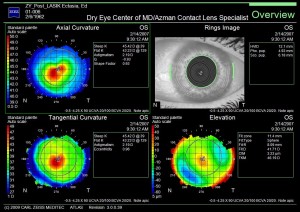Keratoconus:
Dr. Irwin Azman is one of the few contact lens specialists that has extensive experience in the diagnosis and management of the Keratoconus patient. With over 30 years of experience, his team of technicians, new technologies in instrumentation, contact lens materials and designs, Dr. Irwin Azman is able to prescribe each Keratoconus patient with the perfect fit.
Diagnosing Keratoconus:
We are now able to detect the presence of Keratoconus well before subjective symptoms develop. Corneal Topography and Aberrametry measurements have become the standard of care in diagnosing and management of Keratoconus. A computerized system images the shape of the cornea together with the entire optical system by taking tens of thousands of data points. The results are instantly analyzed and wave front topography maps are generated. These printouts will show Dr. Azman a map print (just like a finger print) of the patient’s location and severity of any corneal distortion and high order aberrations (HOA).
Azman Contact Lens Specialists is proud to be the first and only ones in the state of Maryland to employ both new technologies, Marco3-D Wave Corneal Analysis and the Opthonix aberrometer for Keratoconus treatment and management.
Call for a complimentary phone consultation! (240) 782-2020
Health/Life Style and Medical History:
Information concerning your medical health status eye medical status, allergies, family history, and life style and sport activities. Many patients that have allergies have Keratoconus.
Corneal Topography:
The computerized corneal topography measures the cornea’s surface combining, wavefront, auto-refraction, keratometry, and pupillometry — allowing accurate and reliable analysis of corneal High and Low order aberrations. For you, the patient, it is a brief, painless, non-contact procedure that photographs your eye’s surface.
Specular Microscopy:
A noninvasive photographic technique that facilitates accurate and precise diagnosis of corneal disease in the back part of the cornea (endothelium). This instrument can pick up early signs of corneal edema, which cannot be picked up on routine examination. If there is any indication of corneal disease, such as Keratoconus or edema we might recommend a different treatment modality.
Keratoconus Treatment: Scleral Lenses
Corneal specialists agree that it is best to exhaust all non-surgical options for Keratoconus before undergoing corneal transplant surgery, especially for younger patients. Optometrists and Ophthalmologists from all over Maryland and surrounding states refer their challenging Keratoconus patients to Dr. Irwin Azman.
Scleral contacts are large-diameter gas permeable contact lenses specially designed to vault over the entire corneal surface and rest on the “white” of the eye (sclera). In doing so, scleral lenses functionally replace the irregular cornea with a perfectly smooth optical surface to correct vision problems caused by Lasik failures, post-surgical complications, and other corneal irregularities.
Because scleral lenses are designed to vault the corneal surface and rest on the less sensitive surface of the sclera, these lenses often are more comfortable for a person with corneal irregularities. A special liquid fills the space between the back surface of the lens and the front surface of the cornea. This liquid acts as a buffer and protects the compromised corneal tissue. Scleral lenses are designed to fit with little or no lens movement during blinks, making them more stable on the eye, compared with traditional corneal gas permeable lenses. These lenses are almost always very comfortable and the vision provided by them is extremely good. The great majority of patients are able to wear their scleral lenses almost all of their waking hours without problems.
Dr. Irwin Azman prescribes scleral contact lenses for a variety of hard-to-fit eyes, including patients with Stevens-Johnson Syndrome, Radial Keratotomy and Lasik Complications, Keratoconus, Corneal Ectasia, Post-Surgical Vision Loss, and Pellucid Marginal Degeneration.
Dr. Irwin Azman neither avoids nor declines the challenge of prescribing the most difficult cases. Dr. Azman tends to have a perfectionist demeanor.
